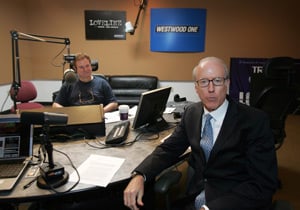Westwood One Inc.’s announcement last week that it will broadcast a panel of presidential hopefuls this fall on a program hosted by Bill O’Reilly, shows the company is back on its game: producing nationally syndicated radio programs.
Following a reduction in the company’s debt, the radio programming and syndication company is refocusing on its core business and developing a range of new programs.
The announcement followed plans unveiled by Westwood One last month to merge with New York radio programming and services company Dial Global. In the all-stock deal, Westwood One’s shareholders will get 41 percent of the combined entity and Dial Global’s will get 59 percent. Dial Global’s top executives will stay on. (Both companies are owned by L.A. investment firms.)
It’s the culmination of a rebuilding effort at Westwood One, which was hurt by advertiser pullback during the recession. The company sells ad space in its programs and sells programming to stations. The company also has been paying down its substantial debt.
To do that, Westwood One, which is headquartered in New York but has major operations in Culver City, sold its secondary line of business, a national TV and radio traffic reporting service called Metro Traffic in April. Clear Channel Communications Inc. in San Antonio bought Metro for $119 million.
Following the sale, Chief Executive Rod Sherwood said the company will focus on producing more original radio content, starting with the O’Reilly show.
Westwood One focuses on original radio shows such as “Monday Night Football” broadcasts and “The Dennis Miller Show.” Dial Global specializes in formatted programming such as country music. Dial Global syndicates its content via satellite, and local stations can buy the feed to fill airtime. The practice is most common in small and mid-sized markets. Dial Global also sells radio services, such as jingles.
Tommy Hadges, president of Pollack Media Group in Pacific Palisades, said the two companies complement each other and that the deal will give Westwood One money to grow its programming.
“This gives Westwood One financial backing to really focus on what they’ve done well for many years, which is offer quality programming,” Hadges said.
The company’s news and talk programming is managed at the company’s New York City office. Its Culver City office handles music, entertainment and sports programming.
Westwood One is controlled by Gores Radio Holdings LLC, a division of the Los Angeles private equity firm Gores Group. Dial Global is owned by Triton Media Group LLC, a portfolio company of L.A. investment firm Oaktree Capital Management L.P.
Traffic cuts
When Gores Group bought a 76 percent stake in the company for $100 million in March 2008, Westwood One was heavily in debt and losing money. In the second quarter of 2008, the company reported a net loss near $200 million.
Gores Group appointed Sherwood, its chief financial officer, to the Westwood One chief executive post in September 2008.
Under Sherwood, Westwood One substantially downsized its Metro Traffic business, which reported spot announcements of traffic and weather conditions around the country, and sold ads within the segments. Westwood slashed the number of Metro Traffic offices from 61 to 13 and cut 15 percent of the workforce.
The company maintained coverage in the same markets. Broadcasts were recorded in hub cities and distributed to smaller markets.
Two months later, the company was de-listed from the New York Stock Exchange, as share prices failed to meet a $1 average for 30 consecutive days. The company also owed about $250 million, which Sherwood said he reduced to about $110 million by spring of 2009, through a debt-to-equity deal that gave large debt holders such as New York Life, MassMutual and ING 23 percent of the company’s shares.
Also that year, Sherwood cut unprofitable programming, such as broadcasts of National Hockey League games.
The company, which had been traded on the Pink Sheets since being de-listed, was re-listed on Nasdaq in November 2009 after a 200-1 reverse stock split.
The sale of the Metro Traffic business in April allowed Westwood One to pay off an additional $104 million in debt.
Now that the debt is under control, Sherwood said he has spent about $15 million adding advertising sales personnel and developing new programming since 2009.
Westwood One reported net income of $14 million for the second quarter of this year, compared with a $5.4 million net loss in the same quarter last year.
Exclusive rights
The merger is expected to gain regulatory approval by the end of the year. After that, the combined Westwood One and Dial Global entity will debut with a secondary offering on a major exchange, according to an insider at the company.
Hadges of Pollack Media Group said the merger with Dial Global forms a broadcasting giant that will give the company greater leverage to negotiate long-term deals with both station owners and talent. Earlier this year, the company signed with the NCAA for the exclusive rights to broadcast the men’s basketball tournament games for more than 10 years.
“It reassures programmers that they have a sound financial standing and that they’ll be in business over the long-term,” Hadges said.
But not everyone is bullish. Al Ehrbar, executive vice president at EVA Dimensions LLC, an investment research firm in New York, rated Westwood One as “hold,” noting that the fiscal year ended in June was the first year of sales increases in six years.

